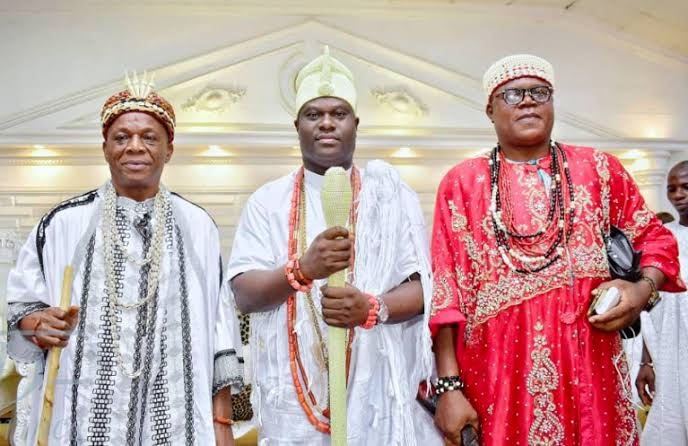
The Ooni of Ife, Oba Adeyeye Ogunwusi, says there is documented evidence that shows the Igbo race migrated from Ile-Ife, Osun State.
The monarch made this statement while challenging Nigerian academics to properly document the history of the Yoruba race, rather than relying on biased history.
He stated that proper documentation will reveal the ties between ethnic groups, providing evidence that the Igbo race migrated from Ile-Ife.
Speaking with journalists, he said: ‘We have good evidence to believe that the Igbo race has its roots here in Ile-Ife. There is Ile-Igbo here in the palace, which was not recently created but has existed here for decades.
For these and many other reasons, I believe that we need proper documentation of our history. We are not involving the government in this project so that we can put all the facts together. We must write our history properly and present things in the correct manner for future generations.'”
The Ooni of Ife’s assertion about the Igbo race having migrated from Ile-Ife sparked intrigue and curiosity among historians, scholars, and the general public alike. As news of his claims spread, discussions emerged, both online and offline, fueling debates about the origins and connections between various ethnic groups in Nigeria.
While some skeptics questioned the Ooni’s statement, dismissing it as mere hearsay or an attempt to bolster the prominence of Ile-Ife, others eagerly awaited the promised documentation that would shed light on this intriguing aspect of Nigerian history. The Ooni’s call for proper documentation was seen as a step toward a more unbiased and comprehensive understanding of the nation’s heritage.
Historians and researchers delved into existing archives, interviewed local elders, and studied the oral traditions passed down through generations. They engaged in collaborative efforts, setting aside regional and ethnic differences, to uncover the roots of the Igbo people as well as strengthen the collective knowledge of their own respective ethnic groups.
As the research progressed, fragments of evidence began to surface, hinting at the existence of historical ties between Ile-Ife and various Igbo communities. Archaeological findings revealed similar artifacts, artistic styles, and cultural practices shared by both regions. Oral histories recounted migration stories, often emphasizing the spiritual significance of Ile-Ife in the Igbo’s ancestral narratives.
The task of documenting this history proved to be a challenging yet rewarding process. Historians meticulously pieced together available information, constantly cross-referencing and fact-checking. They navigated through the complexities of Nigerian history, paying homage to the multiplicity of ethnic groups that constitute the nation’s rich tapestry.
As the project neared its completion, excitement grew among scholars eager to present their findings. The comprehensive documentation incorporated various perspectives, acknowledging the diversity of narratives while striving for a balanced representation of historical events. It emphasized the interconnectedness of different ethnic groups and the shared cultural inheritance that unites Nigeria as a nation.
The final publication, titled “Threads of the Past: Unraveling the Igbo Migration from Ile-Ife,” launched to great acclaim. It revealed a detailed and comprehensive account of the historical ties between Ile-Ife and the Igbo people, supported by an array of irrefutable evidence. The research served as a testament to the power of collaboration, objectivity, and a commitment to preserving the integrity of history.
Future generations embraced this newfound understanding, appreciating the complexities of their shared heritage and fostering unity among diverse ethnic groups. The document ignited a spark of curiosity, prompting further exploration into the interconnectedness of Nigeria’s other ethnic groups and solidifying a commitment to documenting and preserving the nation’s multifaceted history.
The Igbo people, in particular, celebrated the confirmation of their ancestral ties to Ile-Ife, embracing this new chapter in their collective identity. Efforts to strengthen cultural exchange and collaboration between Ile-Ife and Igbo communities flourished, fostering a sense of kinship and appreciation for shared traditions.
The impact of the Ooni’s call for proper documentation of history reverberated throughout Nigeria, inspiring scholars to undertake further research into various aspects of their cultural heritage. The Ooni’s words served as a catalyst for a more inclusive, accurate, and unbiased understanding of history, empowering Nigerians to grasp the intricacies of their nation’s past and forge a united future based on shared knowledge and respect.
